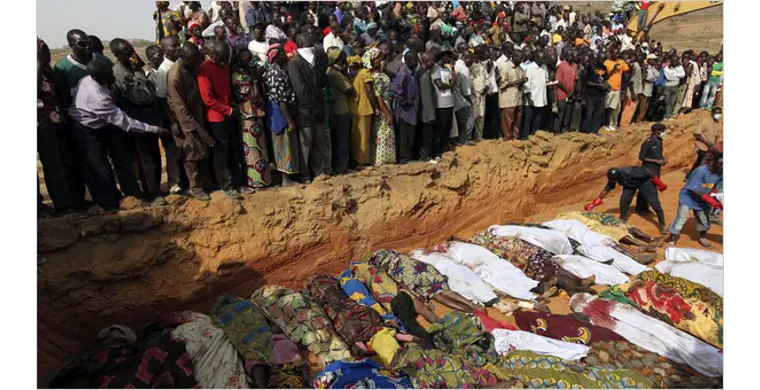British Government urged to address Nigeria's 'unfolding genocide'
By Chris Sugden
CEN
June 17, 2020
"Nigeria - unfolding Genocide", a report of the All Party Parliamentary Group on the Freedom of Religion or Belief was released on Monday June 15. Archbishop Welby was one who gave evidence to the report.
Nigeria's population doubled to 200 million since 1990 and is expected to double to 400 million by 2050. Amnesty International "documented 312 incidents of attacks and reprisal attacks in 22 states and Abuja between January 2016 and October 2018. Amnesty estimates that at least 3,641 people may have been killed, 406 injured, 5,000 houses burnt down, and 182,530 people displaced." Para 6. According to the APPG "One of the main drivers of this persecution in Nigeria is the militant group Boko Haram who frequently abduct and kill those who refuse to conform to their extremist brand of Islam."
The APPG gives evidence that attacks by armed groups of Fulani herdsmen have resulted in the killing, maiming, dispossession and eviction of thousands of Christians. While there is competition for increasingly scarce water and land suitable for grazing, settled farming communities, mainly Christian, have suffered significantly more casualties than the nomadic, mainly Muslim, Fulani herders. "Christian pastors and community heads are specifically targeted. Preceding acts of atrocity and/or during many of the attacks, Fulani herders are reported by survivors to have shouted 'Allah u Akbar', 'destroy the infidels' and 'wipe out the infidels' Para 74
Archdeacon Hassan John of Jos gave evidence that , "The drivers of the violence in Nigeria may be complex but generally speaking Nigerians are deeply religious... So, while there are social, political and economic drivers, the average Nigerian sees all these from their religious perspective first... Christians and Muslims... see this conflict as one religious group's fight to dominate and, if possible, exterminate the other." Para 62
The APPG concludes: "Investigators and commentators must not shy away from describing conflicts as being motivated by religious sectarianism when that is the case. The significance of religious- ideological factors should not be diminished nor denied, but those same actors must take into consideration all possible causes and evidence." Para 102
Failure of Nigerian Government
The APPG claims that " the Nigerian Government's general inability or unwillingness to effectively manage resources, or to offer security or justice to the communities subjected to violence, is one of the key drivers of the escalating violence as it has led to increased competition and the rise of ethno-religious militias. ....Several academics, NGOs, and international organisations told the APPG that the Nigerian government has failed to 1) protect the communities in the Middle Belt from acts of violence; 2) investigate the crimes adequately or at all; and 3) prosecute the perpetrators." Para 62.
This failure is exacerbated by the fact that Christians feel discriminated against and unable to seek redress. "President Buhari stated publicly that it is "a political reality" that that the constituencies where he received 97 percent of his votes [all located in the (Majority Muslim) north] cannot be treated the same as those who gave him only 5 percent [Majority Christian) southeast and south-south]" Para 92.
British Government called to act
It is right to call on the British Government to act, as it has significant responsibility for the current state of affairs. Kathleen McGarvey in Muslim and Christian Women in Dialogue, the Case of Northern Nigeria (in Religions and Discourse Vol 42 Peter Lang) writes: "Through the system of indirect rule, (introduced by Lord Lugard) the Muslim Emirs were given a firm grasp of areas they had previously only raided for slaves or related with as tributaries...According to Rev Yusufu Turaki, the introduction of indirect rule institutionalized the inferiority status of non-Muslim peoples in the southern extreme of the northern region, what is today called the Middle Belt" (see Tainted Legacy: Islam, colonialism and slavery in Northern Nigeria, Turaki, 2010)
Dr Patrick Sookhdeo of Barnabas Fund notes that some Muslims are in denial about these facts and blame the violence on economics or marginalization, everything except religion. Islam is a religion of peace but has utilised violence in the pursuit of peace - as has Christianity in its history. He also notes how difficult it has been for the US and UK to defeat insurgents in Afghanistan and in Iraq, so how much more difficult for Nigeria where the insurgents are willing to kill even their fellow Muslims to achieve their objectives of extending Sharia from the 12 northern states to the whole of Nigeria. He argues that cutting and banning foreign aid (Nigeria received £800,000 every day from the UK between 2011-2018) would harm the very people such action is designed to assist because no aid could be delivered to devastated communities. Far more resources are needed to assist the Nigerian Government and the Military to take action against the terrorists.














